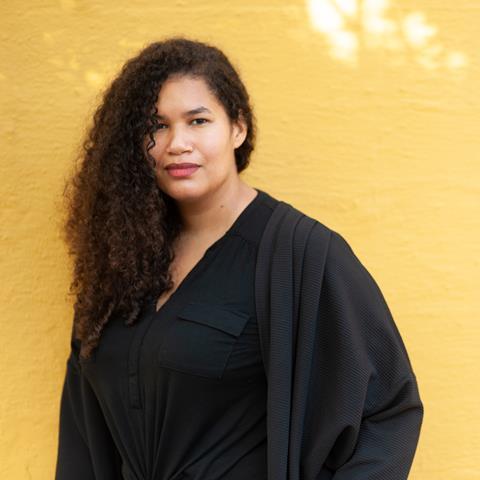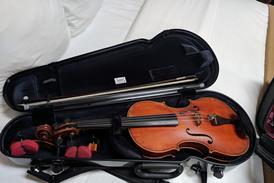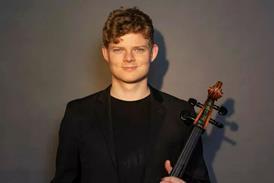Multifaceted musician Cecille Elliott illustrates a joyful and lively environment of music making with musicians from 24 countries

Read more student and player experiences in our Education Hub
I’m a child of the 90s, which culturally for me was everything from The Lion King to Riverdance. I grew up in Michigan, raised in a family where car rides typically included some rotation of Oscar Peterson Trio, Maurice Ravel’s orchestral works, and The Beatles. It’s safe to say I was never one to commit to a singular musical existence. My technical training started with classical violin and viola, then turned towards vocal jazz and classical voice in college. I write electronic music, jazz tunes, pop songs, and chamber music. Multiple music cultures have always fueled me.
My introduction to Silkroad Ensemble was via The Music of Strangers, a documentary released in 2015. The balance of seriousness and joy in its music and message was electric to me. I’m an amateur genealogist, so the idea of connecting musical threads across the cultures of the world was a relatable and beautiful concept to me. I currently live in Portland, Oregon, and was lucky enough to see them perform when they toured here back in winter of 2019. I learnt about Silkroad’s Global Musician Workshop (GMW) this past spring through Instagram. I applied, and to my excitement was accepted to the 60-person 24-country cohort that would meet at New England Conservatory in August 2022.
While there were costs for accommodation and meals, this was the first year that the programme was tuition-free. Upon arriving in Boston that first evening, it was already clear how diverse of a group we were; Brazil, United States, India, etc., our instruments from different traditions across the globe. There was an impromptu jam session after we first met, and suddenly we were off.
Read: String education in regional Western Australia: Sitting on a gold mine
Read: My Experience: violinist Oliver Neubauer, Music@Menlo Chamber Music Festival and Institute
Explore more student and player experiences in our Education Hub
Every day was packed to the brim with content, two band rehearsals in the morning and two in the afternoon, bookended by workshops, meetings, and meals. We were surveyed ahead of time to state faculty preferences. Everyone had three band assignments, leaving one hour free for any number of things; solo practice, break time, or extra group rehearsal. There was a larger break in the afternoon before dinner, and evenings had specialty activities like folk dancing, and themed jam sessions. We could also sign up to teach electives or perform in an open mic, and this was where our cohort’s diversity was especially visible. Electives ranged from Persian classical music, to Nordic fiddle tunes, Mongolian traditional music, and Dagara Gyil music from Ghana just to name a few. Open mic performances ranged from the duduk, to the erhu, to hip hop/rap, to a mandolin/upright bass duo.
Band tunes were taught mostly aurally, though sometimes with charts depending on faculty preference. Improvisation was a key feature in most pieces as well. The expectation was set early on for us to adjust our playing with the musical needs of the tune as well as our group’s instrumentation. This was one of the things that made GMW so special. It was designed to expand our thoughtfulness, sensitivity, and care of musicianship and communication with others, especially when working with someone from a different music culture than our own. One example of this came from my experience learning a tune from Mali in Balla Kouyaté’s band. While listening to and learning the melodies, I made a choice to reverse my western classical violin bowing habits to more appropriately match the swing of the tune. It made more sense musically to play down bows on beats two and four, with a soft up bow on the slurred pickup leading into beats one and three.
It was designed to expand our thoughtfulness, sensitivity, and care of musicianship and communication with others, especially when working with someone from a different music culture than our own
Read: ‘A kinder, more loving way to teach an instrument’: Violinist Augustin Hadelich on the Suzuki Method
Read: Neesa Sunar: How I use the mutuality of Intentional Peer Support in my music teaching
Discover more student and player experiences in our Education Hub
The faculty was incredibly generous with their time and energy. On top of leading band rehearsals, they each lead workshops on specific areas of their expertise and shared music and life lessons during community meetings. They gave a mid-week concert that rocked Jordan Hall, and quite literally set the stage for the following two evenings when each band would perform. Our concerts felt like a celebration of our music cultures, our hard work, and our newfound connections with one another. We closed both concerts with everyone on stage paying homage to Bassam Saba, former Silkroad and GMW faculty member who passed away at the end of 2020, playing his composition Wonderful Land.
I think the biggest favour anyone can do for themselves if considering GMW is to do their best to come open and ready to learn. It was intense but focused, with dozens of opportunities to grow as a globally-minded musician and person. The week was structured to maximise those opportunities. One of my favourite quotes came from Jamey Haddad, who during his community meeting took time to remind everyone that GMW ’is not a candy shop.’ I took this to mean that it’s not a place to come in and then leave with a bag of tricks. It’s a place for musicians from around the world to build together in an effort to move us toward a better understanding of music, our world, and one another.


































No comments yet